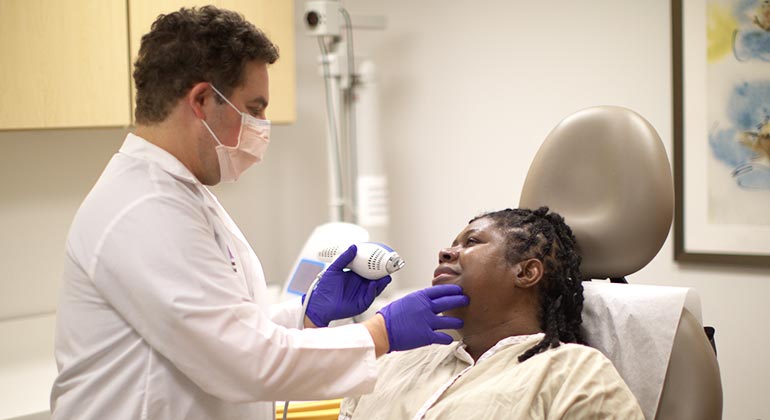Acne

Acne is one the most widespread skin conditions in the United States, affecting the vast majority of people at some point in their lives. It is also one of the most common reasons patients come to see a dermatologist. While it is often thought of as a condition restricted to adolescents, acne can continue or even start in adulthood.
Acne begins when your skin become clogged with excess oil and dead skin cells, leading to inflammation. Certain bacteria can also contribute to acne. These changes can cause whiteheads, blackheads, pimples, or cysts. It usually affects the face, forehead, chest, upper back, and shoulders. Other risk factors for acne are certain medications, occupational exposure to industrial products, and pressure from chin straps or tight collars. Hormones and stress can also make acne worse. While controversial, certain diets including those high in sugar may worsen acne for some people.
In addition to its presence on the skin, acne can affect how you feel about yourself and your appearance. It can contribute to low self-esteem, depression, or anxiety. At Mount Sinai, we can help with a variety of treatment options.
Acne Treatments We Offer
Mount Sinai dermatologists treat acne by targeting the bacteria, sweat glands, and skin cells that contribute to its development. We use treatments applied to your skin as well as treatments that work throughout your body, depending on the severity of your acne and your preferences. We can sometimes manage mild acne with over-the-counter medications. If your acne is more severe or does not respond to these products, you may need a prescription medication. We may also use minimally invasive surgical procedures such as injecting steroids directly into inflamed cysts. For severe acne, we can prescribe a variety of oral medications to help.
Acne Scarring
If you have severe acne, you might get scarring in areas from prior acne lesions. Picking at acne spots can also lead to scarring. The skin in these areas may be darker or redder than your normal skin tone. The spots may also be raised or depressed from the surrounding skin.
Acne Scarring Treatments We Offer
If you get treatment early on, it might be able to prevent permanent scarring. However, if you do get scarring, our Cosmetic Dermatology service offers a range of treatments, from topical agents to chemical peels and lasers that can help.